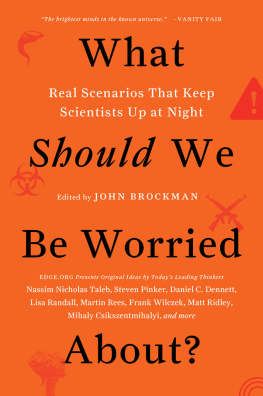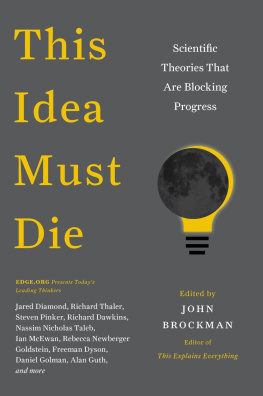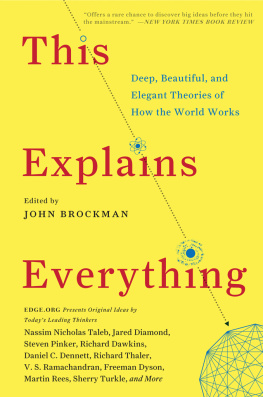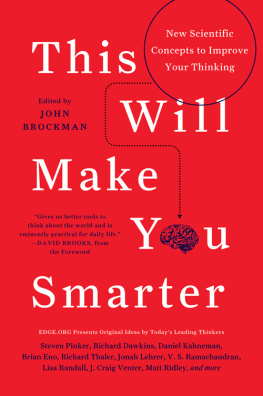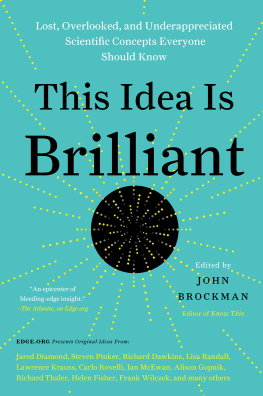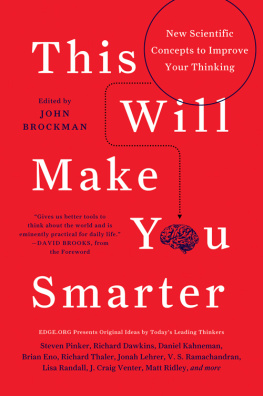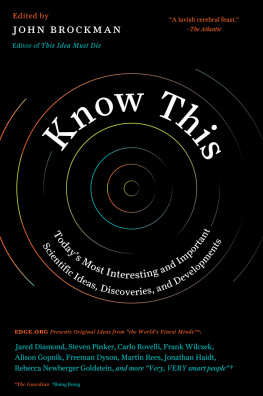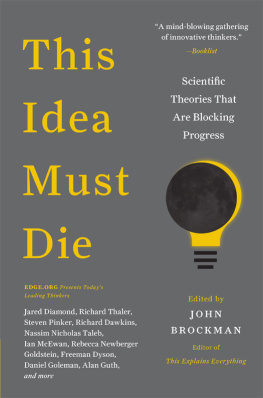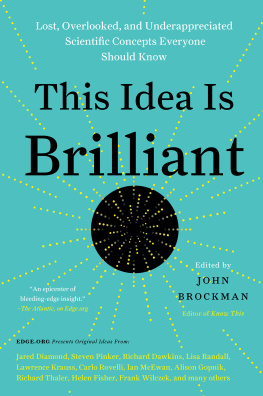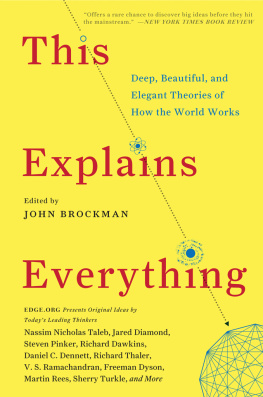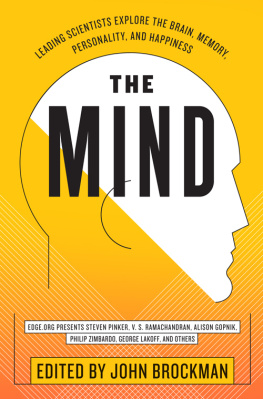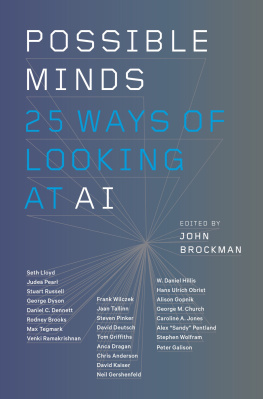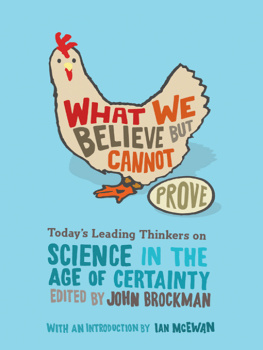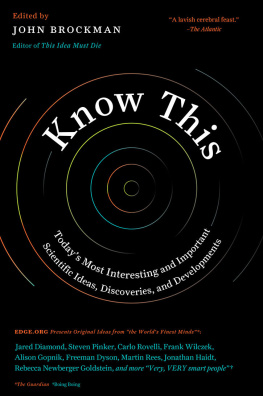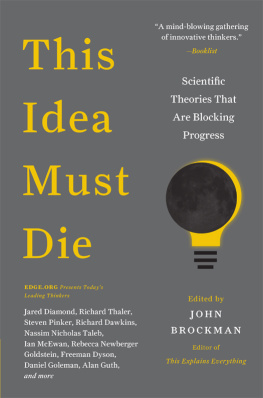To Daniel Kahneman who knows from worry
CONTENTS
I wish to thank Peter Hubbard of HarperCollins for his encouragement. I am also indebted to my agent, Max Brockman, who saw the potential for this book, and, as always, to Sara Lippincott for her thoughtful and meticulous editing.
JOHN BROCKMAN
Publisher & Editor, Edge
JOHN BROCKMAN
In 1981, I founded the Reality Club, an attempt to gather together those people exploring the themes of the postIndustrial Age. In 1997, the Reality Club went online, rebranded as Edge . The ideas presented on Edge are speculative; they represent the frontiers in such areas as evolutionary biology, genetics, computer science, neurophysiology, psychology, cosmology, and physics. Emerging out of these contributions is a new natural philosophy, new ways of understanding physical systems, new ways of thinking that call into question many of our basic assumptions.
For each of the anniversary editions of Edge, I and a number of Edge stalwarts, including Stewart Brand, Kevin Kelly, and George Dyson, get together to plan the annual Edge Questionusually one that comes to one or another of us or our correspondents in the middle of the night. Its not easy coming up with a question. (As the late James Lee Byars, my friend and sometime collaborator, used to say: I can answer the question, but am I bright enough to ask it?) We look for questions that inspire unpredictable answersthat provoke people into thinking thoughts they normally might not have.
The 2013 Edge Question:
WHAT SHOULD WE BE WORRIED ABOUT?
We worry because we are built to anticipate the future. Nothing can stop us from worrying, but science can teach us how to worry better, and when to stop worrying. The respondents to this years question were asked to tell us something that (for scientific reasons) worries themparticularly something that doesnt seem to be on the popular radar yet, and why it should be. Or tell us about something theyve stopped worrying about even if others still do, and why it should drop off the radar.
STEVEN PINKER
Johnstone Family Professor, Department of Psychology, Harvard University; author, The Better Angels of Our Nature: Why Violence Has Declined
Today the vast majority of the worlds people do not have to worry about dying in war. Since 1945, wars between great powers and developed states have essentially vanished, and since 1991 wars in the rest of the world have become fewer and less deadly.
But how long will this trend last? Many people have assured me that it must be a momentary respite, and that a Big One is just around the corner.
Maybe theyre right. The world has plenty of unknown unknowns, and perhaps some unfathomable cataclysm will wallop us out of the blue. But since by definition we have no idea what the unknown unknowns are, we cant constructively worry about them.
What, then, about the known unknowns? Are certain risk factors numbering our days of relative peace? In my view, most people are worrying about the wrong ones, or are worrying about them for the wrong reasons.
Resource shortages. Will nations go to war over the last dollop of oil, water, or strategic minerals? Its unlikely. First, resource shortages are self-limiting: As a resource becomes scarcer and thus more expensive, technologies for finding and extracting it improve, or substitutes are found. Also, wars are rarely fought over scarce physical resources (unless you subscribe to the unfalsifiable theory that all wars, regardless of stated motives, are really about resources: Vietnam was about tungsten; Iraq was about oil, and so on). Physical resources can be divided or traded, so compromises are always available; not so for psychological motives such as glory, fear, revenge, or ideology.
Climate change. There are many reasons to worry about climate change, but major war is probably not among them. Most studies have failed to find a correlation between environmental degradation and war; environmental crises can cause local skirmishes, but a major war requires a political decision that a war would be advantageous. The 1930s Dust Bowl did not cause an American civil war; when we did have a civil war, its causes were very different.
Drones. The whole point of drones is to minimize loss of life compared to indiscriminate forms of destruction such as artillery, aerial bombardment, tank battles, and search-and-destroy missions, which killed orders of magnitude more people than drone attacks in Afghanistan and Pakistan.
Cyberwarfare. No doubt cyberattacks will continue to be a nuisance, and Im glad that experts are worrying about them. But the cyberPearl Harbor that brings civilization to its knees may be as illusory as the Y2Kbug apocalypse. Should we really expect that the combined efforts of governments, universities, corporations, and programmer networks will be outsmarted for extended periods by some teenagers in Bulgaria? Or by government-sponsored hackers in technologically backward countries? Could they escape detection indefinitely, and would they provoke retaliation for no strategic purpose? And even if they did muck up the Internet for a while, could the damage really compare to being blitzed, firebombed, or nuked?
Nuclear inevitability. Its obviously important to worry about nuclear accidents, terrorism, and proliferation, because of the magnitude of the devastation nuclear weapons could wreak, regardless of the probabilities. But how high are the probabilities? The sixty-eight-year history of non-use of nuclear weapons casts doubt on the common narrative that we are still on the brink of nuclear Armageddon. That narrative requires two extraordinary propositions: (1) That leaders are so spectacularly irrational, reckless, and suicidal that they have kept the world in jeopardy of mass annihilation, and (2) we have enjoyed a spectacularly improbable run of good luck. Perhaps. But instead of believing in two riveting and unlikely propositions, perhaps we should believe in one boring and likely one: that world leaders, although stupid and short-sighted, are not that stupid and short-sighted and have taken steps to minimize the chance of nuclear war, which is why nuclear war has not taken place. As for nuclear terrorism, though there was a window of vulnerability for theft of weapons and fissile material after the fall of the Soviet Union, most nuclear security experts believe it has shrunk and will soon be closed (see John Muellers Atomic Obsession ).
What the misleading risk factors have in common is that they contain the cognitive triggers of fear documented by Slovic, Kahneman, and Tversky: They are vivid, novel, undetectable, uncontrollable, catastrophic, and involuntarily imposed on their victims.
I N MY VIEW, there are threats to peace that we should worry about, but the real risk factorsthe ones that actually caused catastrophic wars, such as the World Wars, wars of religion, and the major civil warsdont press the buttons of our lurid imaginations:
Narcissistic leaders. The ultimate weapon of mass destruction is a state. When a state is taken over by a leader with the classic triad of narcissistic symptomsgrandiosity, need for admiration, and lack of empathythe result can be imperial adventures with enormous human costs.
Groupism. The ideal of human rightsthat the ultimate moral good is the flourishing of individual people, while groups are social constructions designed to further that goodis surprisingly recent and unnatural. People, at least in public, are apt to argue that the ultimate moral good is the glory of the groupthe tribe, religion, nation, class, or raceand that individuals are expendable, like the cells of a body.
Perfect justice. Every group has suffered depredations and humiliations in its past. When groupism combines with the thirst for revenge, a group may feel justified in exacting damage on some other group, inflamed by a moralistic certitude that makes compromise tantamount to treason.

